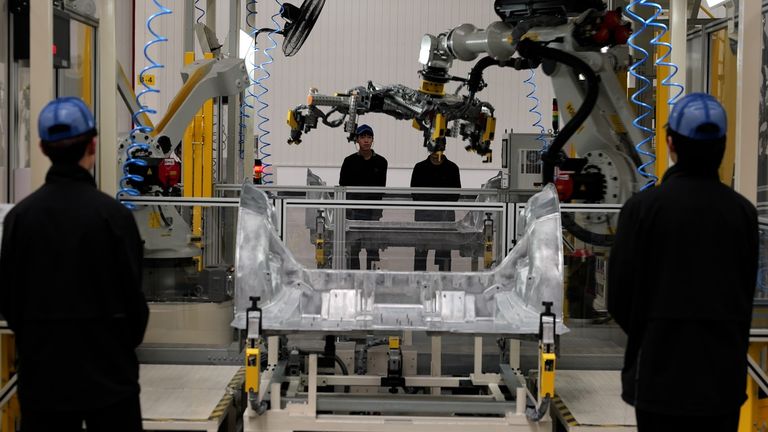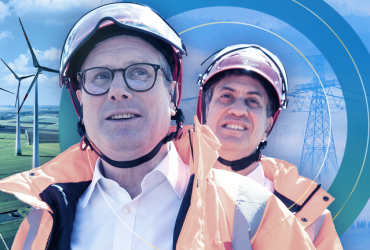There’s a trade war brewing between China and the West, at stake is who will dominate the global market for electric vehicles.
Outside the port city of Ningbo, Chinese car company Zeekr is rolling out luxury EVs and growing fast. The factory has only been up and running for three years, but this year it’s more than doubling production.
Zeekr is a new player in the EV market, but it has unbridled ambition to sell its high-end, high-tech cars abroad. It’s a subsidiary of a state-backed company, Geely.
However, US and EU critics say the financial backing and vast resources of China’s government gives companies like Zeekr an unfair advantage.
In a recent trip to Beijing US treasury secretary Janet Yellen accused China of “overproduction” and “dumping” its EVs on overseas markets. The European Commission has started an investigation into whether to impose punitive tariffs on China’s industry.
But at Zeekr the threat of tariffs is being talked down. The company insists the global market is big enough for everyone.
Speaking to Sky News at a massive auto show on the outskirts of Beijing, Zeekr vice president Chen Yu explained that when foreign car companies first started setting up EV plants in China, local car companies watched on and learned fast.
“Definitely,” Mr Chen said. “We learned about the performance, the design, the culture, everything.”
Now companies like Zeekr, and BYD which is a giant in the Chinese EV manufacturing market, are taking on traditional car companies.
“I would not say (Chinese EVs) are dominating the market. I would say just they bring more diversity to the local customer, that is the nature of competition as you know,” Mr Chen said.
However, the possibility of Europe slapping tariffs on Chinese EVs is a concern for the Zeekr executive: “Definitely, if the tariff goes up, no doubt we are worried about the potential challenge.”
On the floor of the auto show, car dealers and importers were clearly impressed with China’s EVs and warned legacy car manufacturers that they are in trouble.
New Zealand car dealer Matthew Foot has been attending the annual show for five years, and said: “It’s going to be very hard to beat China. They get incredible resources from the government; from lithium mines, to the ships and everything in between.
“Obviously you can see why Europe is fearing them and taxing them as well.”
This week US Secretary of State Antony Blinken is in China. Trade tensions are on the agenda, alongside the world’s geo-political crises.
The US already imposes a 27.5% tariff on Chinese cars. But in Europe it’s only 10% and that makes companies like VW, Volvo and BMW increasingly nervous.
In Beijing last week German Chancellor Olaf Scholz said: “It’s clear that we have to talk about questions of overcapacity, and that we have to talk about subsidy competition.”
Germany is in a difficult position. As Europe’s largest car manufacturer, it fears that if the EU slaps tariffs on Chinese cars, China could retaliate by restricting access to its vast market.
But the fact is, more than half of all new electric cars sold worldwide are from China and it can make them cheaper and faster than its competitors.
At the end of last year China’s EV giant, BYD, sold more electric cars than Tesla. Tesla was back on top last quarter, but the competition is fierce.
The scale of production is staggering. BYD owns its mines, battery factories and eight ships.
Even a comparatively smaller company like Zeekr is the model of efficiency, with 2,700 workers churning out around 500 cars a day.
The focus on EVs is part of Chinese President Xi Jinping’s plan to overhaul the country’s debt-driven economy. He calls it “new production forces”. Investing in infrastructure is out, new technology is in.
In the industrial hub of Anhui Province, local officials are also brushing off the looming threat of tariffs. Provincial official Pan Feng said: “Some countries, thinking about their short-term self-interests, introduced some regulations, but I think they are only temporary.
“China is a big country, with a big market, it has huge power and confidence to counteract these conflicts.”
Chinese buyers are also confident about their country’s electric cars, purchasing more than seven million of them domestically last year.
The country also has more charging stations than anywhere else on the planet.
While charging his BYD electric car in Zhejiang Province, Mr Zhang told us: “Chinese-made cars are good enough for us ordinary Chinese. If you’re thinking of buying an EV, there’s no need to go for a Mercedes or a German EV.”









